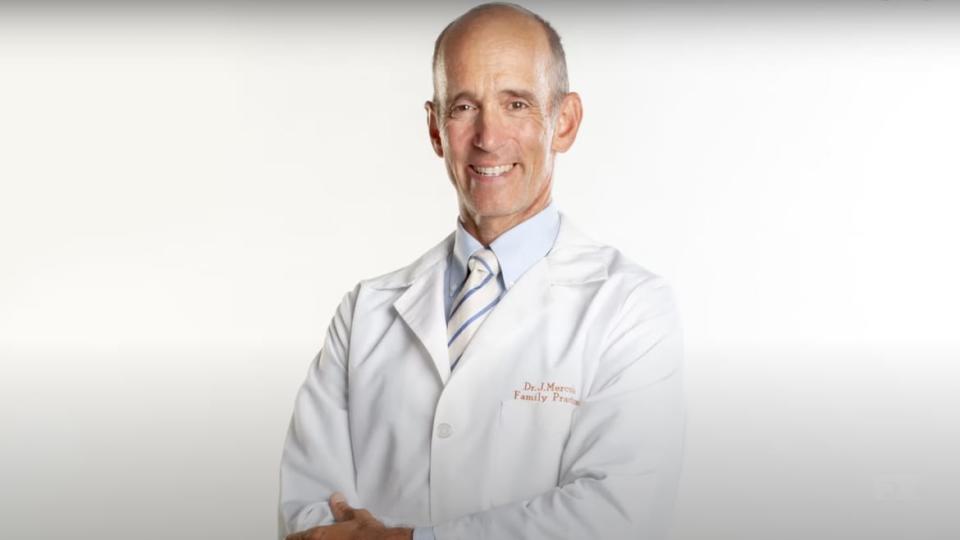The Notorious Anti-Vax Doc Giving Alex Jones a Run for His Money

“Widow Tells the Story How Her Husband Died From the Jab.”
“Musician Loses Livelihood After Taking the Shot.”
These are just a sampling of the headlines that make up Mercola.com, the website of Florida-based anti-vax quack Joseph Mercola. Its success allowed the former doctor to stop seeing patients in 2009 and focus full-time on peddling unfounded treatments for mystery illnesses to his desperate following.
The site’s tone will be familiar to anyone who’s ever closed out 15 pop-ups to watch a movie on a shady website. It’s exaggerated and pessimistic, with fearmongering about 5G cellphone towers sharing space with alluringly simple solutions, like an $87 vitamin compound. This is the formula that’s made Mercola $100 million, according to a 2017 affidavit obtained by The Washington Post.
One of his recent headlines slams The New York Times for engaging in “classic Orwellian doublespeak” in a new “hit piece documentary.” That would be Superspreader, the latest episode of The New York Times Presents premiering on FX and Hulu on Aug. 19.
The hour-long doc, based on a New York Times article from 2021, traces Mercola’s rise from well-meaning osteopath, defined by the Mayo Clinic as a licensed doctor who “focuses on the body’s interconnected system of nerves, muscles and bones,” to a conspiracy hawker who came in at No. 1 in last year’s “Disinformation Dozen” list from the Center for Countering Digital Hate.
The Man Who Investigated Princess Diana’s Death Tells All
Mercola, 68, was raised in Chicago. After graduating from the University of Illinois, he completed medical school at the Chicago College of Osteopathic Medicine, now part of Midwestern University. He then started to practice medicine, espousing a healthy amount of skepticism about the pharmaceutical industry that grew increasingly paranoid until he eventually became a pill-pusher in his own right, marketing poppycock panaceas to his flourishing fanbase.
The non-practicing physician has 1.7 million followers on Facebook and hundreds of thousands more on Twitter and Instagram. He routinely rails against the unsubstantiated fatal side effects of the COVID-19 vaccine, ignoring multiple warnings and fines from the Centers for Disease Control and the Federal Trade Commission about his unscientific claims and misleading advertising for products, including a tanning bed that he claims doesn’t increase the risk of cancer. (Spoiler Alert: They all do.)
Pushback from the government and the medical establishment emboldens him, says former Chicago magazine writer Bryan Smith in the documentary. Mercola will just double down and use it as proof that he’s being persecuted, making any effort to reel in his harmful rhetoric nearly futile. Sometimes the government drops the ball altogether, like when the Small Business Administration forgave his nearly $500,000 in PPP loans despite his dangerous drivel.
How could someone let themselves be seduced by these half-baked, tired ideas about natural health that contradict every respected health authority in the world? It’s easy to blame his followers for doing this to themselves. That is until we meet Diane Langston, who was diagnosed with Stage 4 ovarian cancer four years ago. She credits Mercola with saving her life as she dutifully picks up his shipments from her front porch. Worn down by years of surgeries and chemo, and terrified of the debilitating side effects, she parrots claims from his website about the dangers of chemotherapy, even after admitting that Mercola’s cure-alls comprise just one-third of her treatment plan. It’s the kind of cognitive dissonance driven by fear—Mercola’s most successful product.
His remedies only get more absurd with time, like when he encouraged his followers to nebulize themselves with hydrogen peroxide to treat COVID-19. (By the way, don’t do that.)
Superspreader lays bare the parallels between Mercola and Alex Jones. The Sandy Hook denier built his empire in much the same way: delivering doomsday predictions and anti-government rants that plant the need for, say, a $37 B12 serum. The massive income generated from these sales is then used to rail against a medical and regulatory establishment that is, in their words, profiting off your illness, oppression, and lack of bodily autonomy. Jones’ model was detailed extensively in this year’s CNN documentary, Megaphone for Conspiracy: The Alex Jones Story. But where Jones is brash, belligerent and off-putting, Mercola is soft-spoken and authoritative, making his shtick all the more insidious.
“It felt genuine,” says one woman in the documentary, describing how she found comfort in Mercola’s videos. Though we never find out her condition, or if she has one at all, she recalls being told to seek psychiatric help after complaining about a laundry list of symptoms, including regular lung infections. This feeling of dismissal drove her further into Mercola’s arms. Langston, who still hasn’t disavowed him, shares a similar sense of distrust in traditional medicine, revealing that she hasn’t told her oncologist about her secret stash of supplements.
This is where Superspreader could use a little more reporting about the weaponization of “wellness,” a word that means absolutely nothing to many of us but that can easily grow into an obsession for people who feel vulnerable and distrustful for one reason or another. A con artist will always be waiting in the wings waiting to sell you a $100 fluoride removal filter—global pandemic or not.
Want to go deeper? Read more about the movies, shows, and pop-culture moments we just can’t get enough of on the Daily Beast’s Obsessed.
Get the Daily Beast's biggest scoops and scandals delivered right to your inbox. Sign up now.
Stay informed and gain unlimited access to the Daily Beast's unmatched reporting. Subscribe now.

 Yahoo Movies
Yahoo Movies 